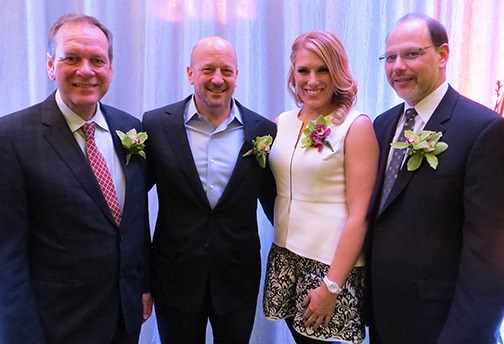On February 26, SFU alumni, administrators, students and members of the public gathered at the Four Seasons hotel in Vancouver to honour four exceptional people who have been chosen as the 2013 Outstanding Alumni.
Tim Martin (MA 84) recently completed a two-year posting as Canadas ambassador in Colombia, a role he also played in Argentina and Paraguay. He was Canada's representative in Afghanistan and also served as chair of the Kimberly Process for Conflict on Diamonds (blood diamonds.)
Lance Uggla (BBA 85) is the co-founder and CEO of Markit, a global powerhouse in financial information and services.
Krista Guloien (BA 04) learned how to row at SFU and went on to win a silver medal in rowing at the 2012 Olympics.
Howard Sapers (BA 80) is Canadas only federal correctional investigator, acting as ombudsman for men and women in correctional facilities across the country.
In his inspirational speech, Tim Martin touched on the profound importance of SFU's motto Engaging the World.
He has graciously agreed to share his message of how we can all better engage with people we don't even know, but want to help, with WE Vancouver readers.
By Tim Martin
What I want to share with you tonight, is that, in my personal journey of engaging the world, I have kept re-discovering the same thing everywhere I go.
We can always communicate with other people. We can always find a way. In my experience as a Canadian diplomat, often working in troubled or conflict affected countries, we can always make a connection - no matter how wide the cultural gulf that may exist. It is part of our common human condition for us to be able to share with one another. It is in our nature to find those connections.
One day when I was walking in the Guatemalan mountains back to San Pedro I met a farmer on the path.
He said. "I know your brother."
I was very surprised. I don't have a brother.
"Yes yes, you do. He was here last year. Just like you - he had blonde hair and blue eyes."
He was curious about me, and he wanted to find that connection somehow.
And it will always be true that we can help each other.
But what about when those in distress are separated from us by danger? When they are living in armed conflict? Sometimes it may seem that, as comfortable Canadians, it is a gulf too wide to engage with this world.
I am always optimistic that through diplomacy and development we can help others to solve their problems, but having lived in places like Palestine and Kandahar, my optimism is now more tempered by large shovels full of humility, caution and patience.
Once I heard Shimon Peres say: Optimists and pessimists die the just the same way... the difference is how they live.
In my opinion, when we engage the world, we still need to think about human and personal connections. Sure, foreign policy is important. But lecturing from the sidelines doesn't make a difference. This may sound trite, but it is true none the less that it all boils down to personal relationships and the construction of trust. We can't guess what is better for people if we don't talk to them.
In Kandahar, this was a lesson that was learned and it was critical to the success of Canada's stabilization and reconstruction work there. In earlier days, schools and clinics had been built, but sometimes people were afraid to send their kids, or even worse - development projects became Taliban targets.
We learned that projects could only work when the communities were engaged in real dialogue. When they gave their permission, their opinion and their blessing for projects. Then they would protect projects. Then the insurgents decided not to hit targets because that would be an attack on the community.
The business of building trust bridges across divides is difficult. And so is the task of making them strong enough so that they can support understanding of one another's aspirations. But this is what it takes when we sincerely wish to help build peace and development for people suffering from conflict and war.
Engaging the world is so very necessary and urgent as we look at the problems in Canada and beyond our borders.
Chancellor, Taylor, President Petter, President Yeung and Dean Pierce, there is no limit to how far this motto can take our great university.
Thank you very much, SFU, for this award, and for having enriched my life.
The gala was hosted by the SFU Alumni Association. For more information about this year's recipients, as well as past year's recipients, go here. Read more about Tim Martin's newest venture, Diplomatic Counsel, here.



